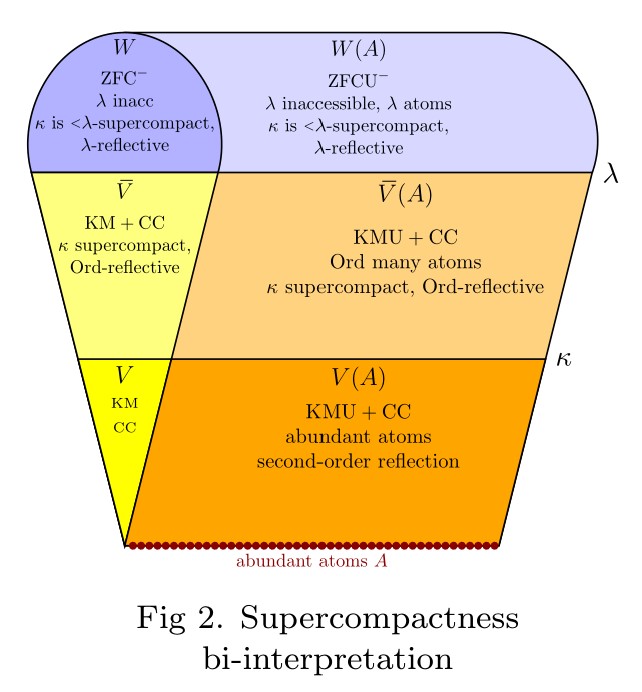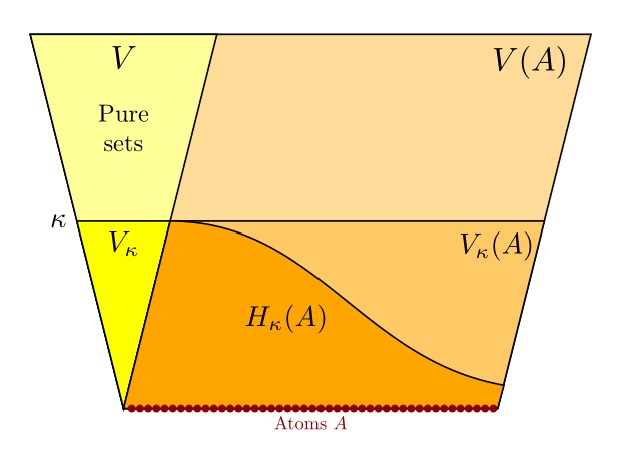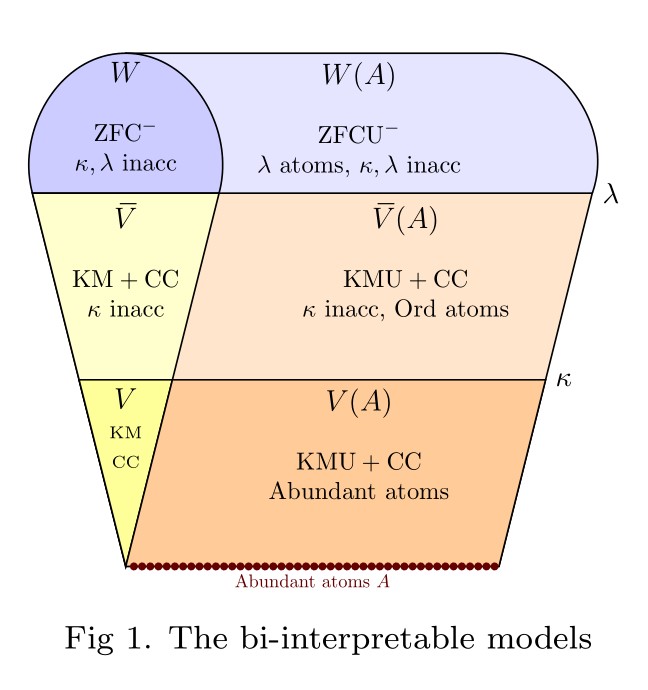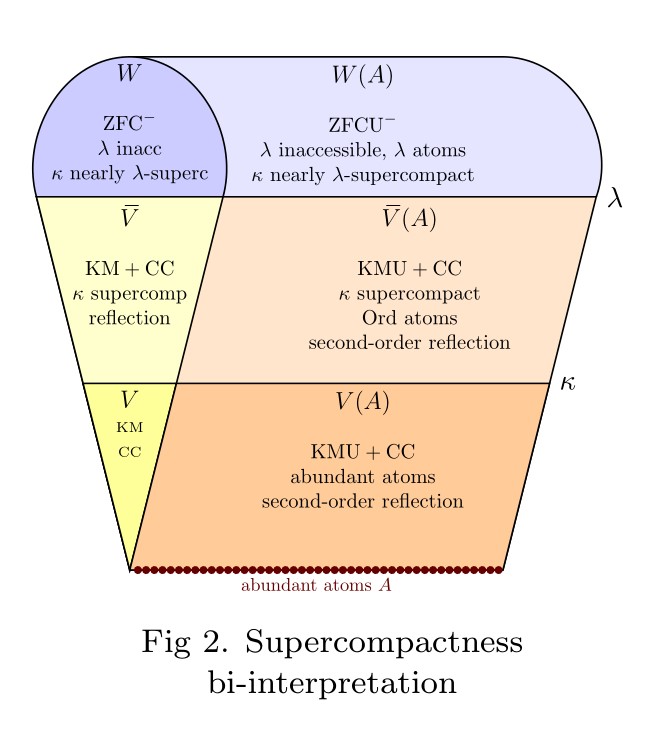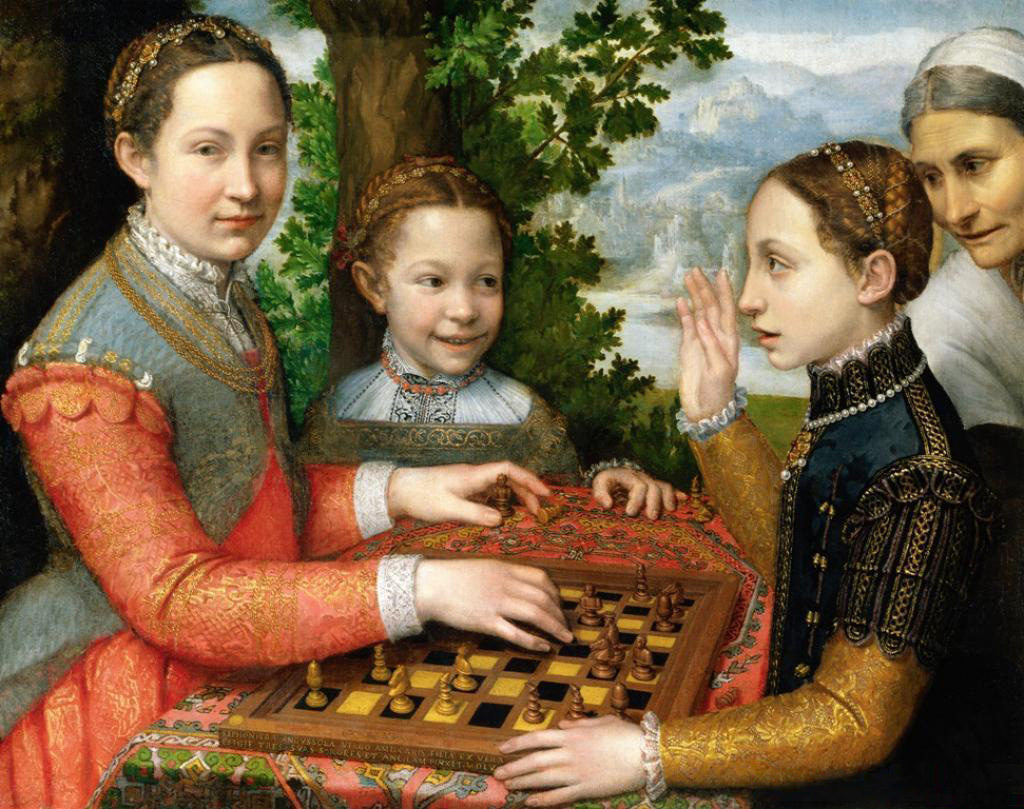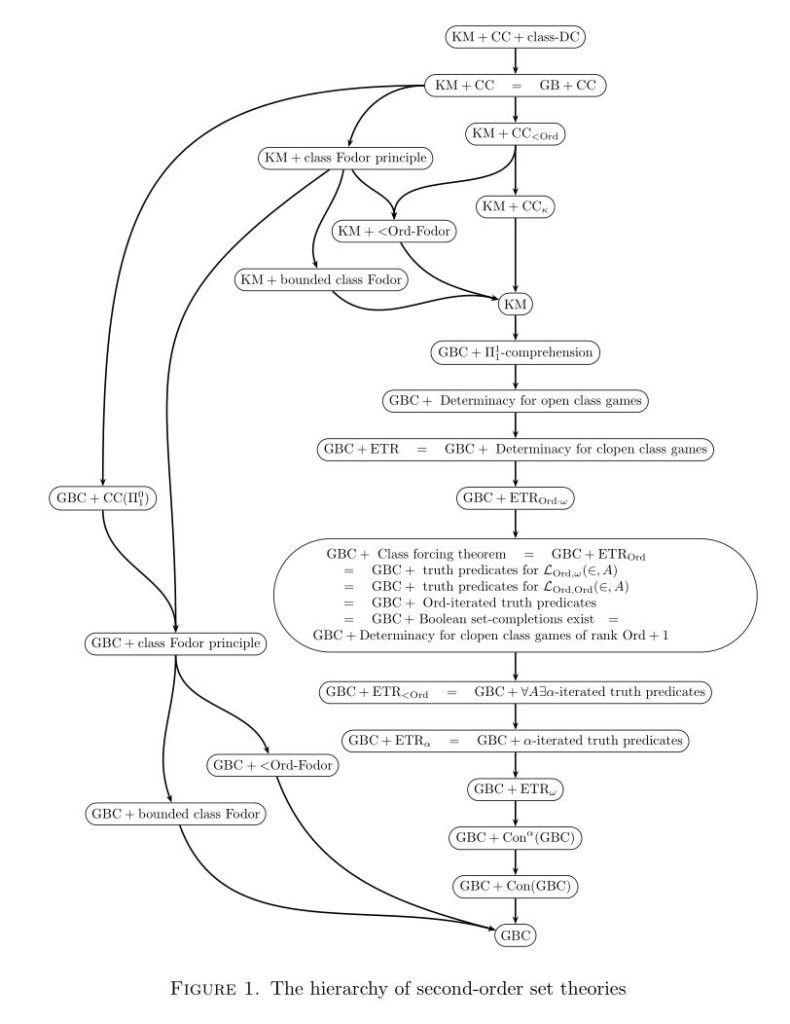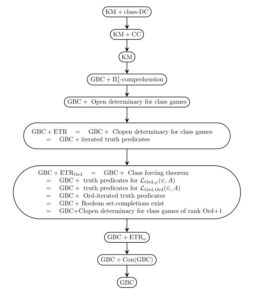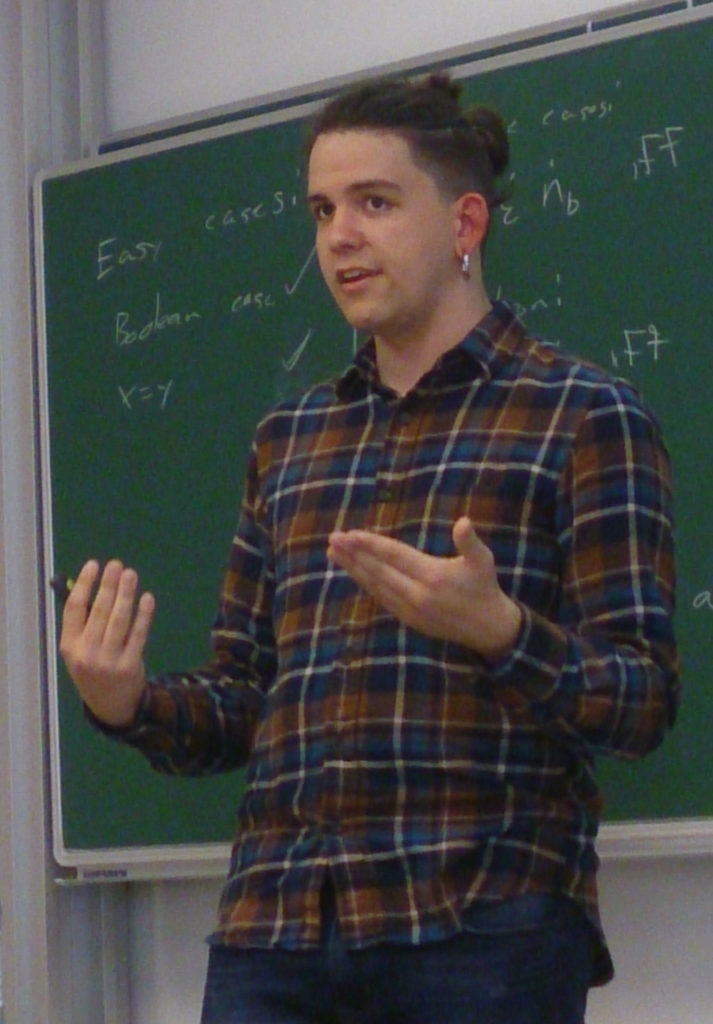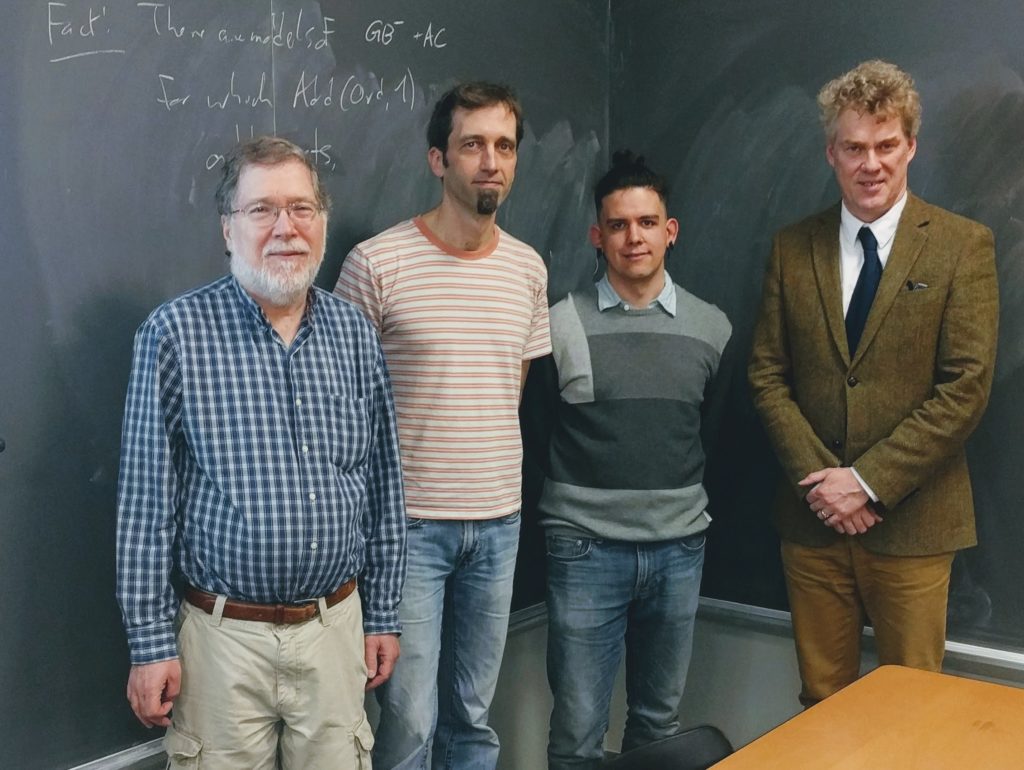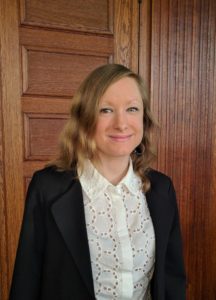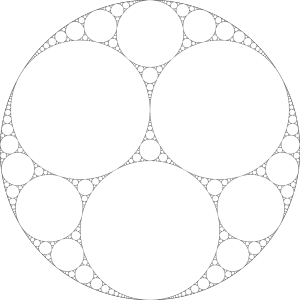
$\newcommand\Tr{\text{Tr}}$One of the intriguing lessons we have learned in the past half-century of set-theoretic developments is that there is a surprisingly robust connection between infinitary game theory and fundamental set-theoretic principles, including large cardinals. Assertions about the existence of strategies in infinite games often turn out to have an unexpected set-theoretic power. In this post, I should like to give another specific example of this, which Thomas Johnstone and I hit upon yesterday in an enjoyable day of mathematics.
Specifically, I’d like to prove that if we generalize the open-game concept from sets to classes, then assuming consistency, ZFC cannot prove that every definable open class game is determined, and indeed, over Gödel-Bernays set theory GBC the principle of open determinacy (and even just clopen determinacy) implies Con(ZFC) and much more.
To review a little, we are talking about games of perfect information, where two players alternately play elements from an allowed space $X$ of possible moves, and together they build an infinite sequence $\vec x=\langle x_0,x_1,x_2,\ldots\rangle$ in $X^\omega$, which is the resulting play of this particular instance of the game. We have a fixed collection of plays $A\subset X^\omega$ that is used to determine the winner, namely, the first player wins this particular instance of the game if the resulting play $\vec x$ is in $A$, and otherwise the second player wins. A strategy for a player is a function $\sigma:X^{<\omega}\to X$, which tells a player how to move next, given a finite position in the game. Such a strategy is winning for that player, if he or she always wins by following the instructions, no matter how the opponent plays. The game is determined, if one of the players has a winning strategy.
It is a remarkable but elementary fact that if the winning condition $A$ is an open set, then the game is determined. One can prove this by using the theory of ordinal game values, and my article on transfinite game values in infinite chess contains an accessible introduction to the theory of game values. Basically, one defines that a position has game value zero (for player I, say), if the game has already been won at that stage, in the sense that every extension of that position is in the winning payoff set $A$. A position with player I to play has value $\alpha+1$, if player I can move to a position with value $\alpha$, and $\alpha$ is minimal. The value of a position with player II to play is the supremum of the values of all the positions that he or she might reach in one move, provided that those positions have a value. The point now is that if a position has a value, then player I can play so as strictly to decrease the value, and player II cannot play so as to increase it. So if a position has a value, then player I has a winning strategy, which is the value-reducing strategy. Conversely, if a position does not have a value, then player II can maintain that fact, and player I cannot play so as to give it a value; thus, in this case player II has a winning strategy, the value-maintaining strategy. Thus, we have proved the Gale-Stewart theorem: every open game is determined.
That proof relied on the space of moves $X$ being a set, since we took a supremum over the values of the possible moves, and if $X$ were a proper class, we couldn’t be sure to stay within the class of ordinals and the recursive procedure might break down. What I’d like to do is to consider more seriously the case where $X$ is a proper class. Similarly, we allow the payoff collection $A$ to be a proper class, and the strategies $\sigma:X^{<\omega}\to X$ are also proper classes. Can we still prove the Gale-Steward theorem for proper classes? The answer is no, unless we add set-theoretic strength. Indeed, even clopen determinacy has set-theoretic strength.
Theorem. (GBC) Clopen determinacy for proper classes implies Con(ZFC) and much more. Specifically, there is a clopen game, such the existence of a winning strategy is equivalent to the existence of a satisfaction class for first-order truth.
Proof. Let me first describe a certain open game, the truth-telling game, with those features, and I shall later modify it to a clopen game. The truth-telling game will have two players, which I call the challenger and the truth-teller. At any point in the game, the challenger plays by making an inquiry about a particular set-theoretic formula $\varphi(\vec a)$ with parameters. The truth-teller must reply to the inquiry by stating either true or false, and in the case that the formula $\varphi$ is an existential assertion $\exists x\,\psi(x,\vec a)$ declared to be true, then the truth teller must additionally identify a particular witness $b$ and assert that $\psi(b,\vec a)$ is true. So a play of the game consists of a sequence of such inquires and replies.
The truth-teller wins a play of the game, provided that she never violates the recursive Tarskian truth conditions. Thus, faced with an atomic formula, she must state true or false in accordance with the actual truth or falsity of that atomic formula, and similarly,
she must say true to $\varphi\wedge\psi$ just in case she said true to both $\varphi$ and $\psi$ separately (if those formulas had been issued by the challeger), and she must state opposite truth values for $\varphi$ and $\neg\varphi$, if both are issued as challenges.
This is an open game, since the challenger will win, if at all, at a finite stage of play, when the violation of the Tarskian truth conditions is first exhibited.
Lemma 1. The truth-teller has a winning strategy in the truth-telling game if and only if there is a satisfaction class for first-order truth.
Proof. Clearly, if there is a satisfaction class for first-order truth, then the truth-teller has a winning strategy, which is simply to answer all questions about truth by consulting the
satisfaction class. Since that class obeys the Tarskian conditions, she will win the game, no matter which challenges are issued.
Conversely, suppose that the truth-teller has a winning strategy $\tau$ in the game. I claim that we may use $\tau$ to build a satisfaction class for first-order truth. Specifically, let $T$ be the collection of formulas $\varphi(\vec a)$ that are asserted to be true by $\tau$ in any play according to $\tau$. I claim that $T$ is a satisfaction class. We may begin by noting that since $T$ must correctly state the truth of all atomic formulas, it follows that the particular answers that $\tau$ gives on the atomic formulas does not depend on the order of the challenges issued by the challenger. Now, we argue by induction on formulas that the truth values issued by $\tau$ does not depend on the order of the challenges. For example, if all plays in which $\varphi(\vec a)$ is issued as a challenge come out true, then all plays in which $\neg\varphi(\vec a)$ is challenged will result in false, or else we would have a play in which $\tau$ would violate the Tarskian truth conditions. Similarly, if $\varphi$ and $\psi$ always come out the same way, then so does $\varphi\wedge\psi$. We don’t claim that $\tau$ must always issue the same witness $b$ for an existential $\exists x\,\psi(x,\vec a)$, but if it ever says true to this statement, then it will provide some witness $b$, and for that statement $\psi(b,\vec a)$, the truth value stated by $\tau$ is independent of the order of play by the challenger, by induction. Thus, by induction on formulas, the answers provided by the truth-teller strategy $\tau$ gives us a satisfaction predicate for first-order truth. QED
Lemma 2. The challenger has no winning strategy in the truth-telling game.
Proof. Suppose that $F$ is a strategy for the challenger. So $F$ is a proper class function that directs the challenger to issue certain challenges, given the finite sequence of previous challenges and truth-telling answers. By the reflection theorem, there is a closed unbounded proper class of cardinals $\theta$, such that $F”V_\theta\subset V_\theta$. That is, $V_\theta$ is closed under $F$, in the sense that if all previous challenges and responses come from $V_\theta$, then the next challenge will also come from $V_\theta$. Since $\langle V_\theta,\in\rangle$ is a set, we have a satisfaction predicate on it. Consider the play, where the truth-teller replies to all inquires by consulting truth in $V_\theta$, rather than truth in $V$. The point is that if the challenger follows $\tau$, then all the inquiries will involve only parameters $\vec a$ in $V_\theta$, provided that the truth-teller also always gives witnesses in $V_\theta$, which in this particular play will be the case. Since the satisfaction predicate on $V_\theta$ does satisfy the Tarskian truth conditions, it follows that the truth-teller will win this instance of the game, and so $F$ is not a winning strategy for the challenger. QED
Thus, if open determinacy holds for classes, then there is a satisfaction predicate for first-order truth.
This implies Con(ZFC) for reasons I explained on my post KM implies Con(ZFC) and much more, by appealing to the fact that we have the collection axiom relative to the class for the satisfaction predicate itself, and this is enough to verify that the nonstandard instances of collection also must be declared true in the satisfaction predicate.
But so far, we only have an open game, rather than a clopen game, since the truth-teller wins only by playing the game out for infinitely many steps. So let me describe how to modify the game to be clopen. Specifically, consider the version of the truth-telling game, where the challenger must also state on each move a specific ordinal $\alpha_n$, which descend during play $\alpha_0>\alpha_1>\cdots>\alpha_n$. If the challenger gets to $0$, then the truth-teller is declared the winner. For this modified game, the winner is known in finitely many moves, because either the truth-teller violates the Tarskian conditions or the challenger hits zero. So this is a clopen game. Since we made the game harder for the challenger, it follows that the challenger still can have no winning strategy. One can modify the proof of lemma 1 to say that if $\tau$ is a winning strategy for the truth teller, then the truth assertions made by $\tau$ in response to all plays with sufficiently large ordinals for the challenger all agree with one another independently of the order of the formulas issued by the challenger. Thus, there is a truth-telling strategy just in case there is a satisfaction class for first-order truth.
So clopen determinacy for class games implies the existence of a satisfaction class for first-order truth, and this implies Con(ZFC) and much more. QED
One may easily modify the game by allowing a fixed class parameter $B$, so that clopen determinacy implies that there is a satisfaction class relative to truth in $\langle V,\in,B\rangle$.
Furthermore, we may also get iterated truth predicates. Specifically, consider the iterated truth-telling game, which in addition to the usual language of set theory, we have a hierarchy of predicates $\Tr_\alpha$ for any ordinal $\alpha$. We now allow the challenger to ask about formulas in this expanded language, and the truth teller is required to obey not only the usual Tarskian recursive truth conditions, but also the requirements that $\Tr_\alpha(\varphi(\vec a))$ is declared true just in case $\varphi(\vec a)$ uses only truth predicates $\Tr_\beta$ for $\beta<\alpha$ and also $\varphi(\vec a)$ is declared true (if this challenge was issued).
The main arguments as above generalize easily to show that the challenger cannot have a winning strategy in this iterated truth-telling game, and the truth-teller has a strategy just in case there is a satisfaction predicate for truth-about-truth iterated through the ordinals. Thus, the principle of open determinacy for proper class games implies Con(Con(ZFC)) and $\text{Con}^\alpha(\text{ZFC})$ and so on.
Let me finish by mentioning that Kelley-Morse set theory is able to prove open determinacy for proper class games in much the same manner as we proved the Gale-Stewart theorem above, using well-ordered class meta-ordinals, rather than merely set ordinals, as well as in other ways. If there is interest, I can make a further post about that, so just ask in the comments!


